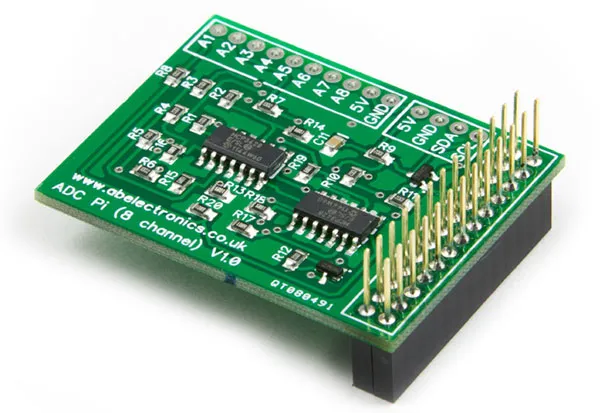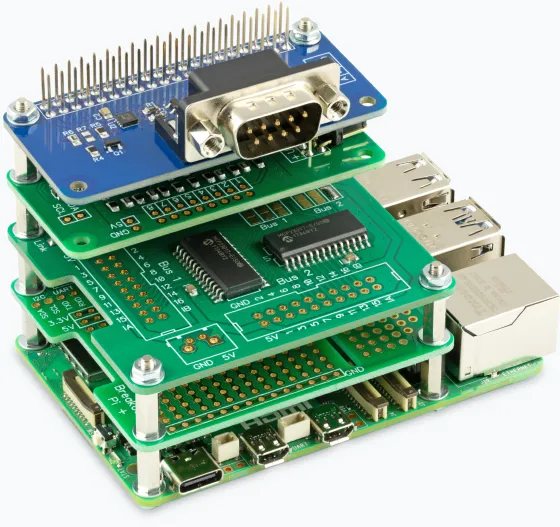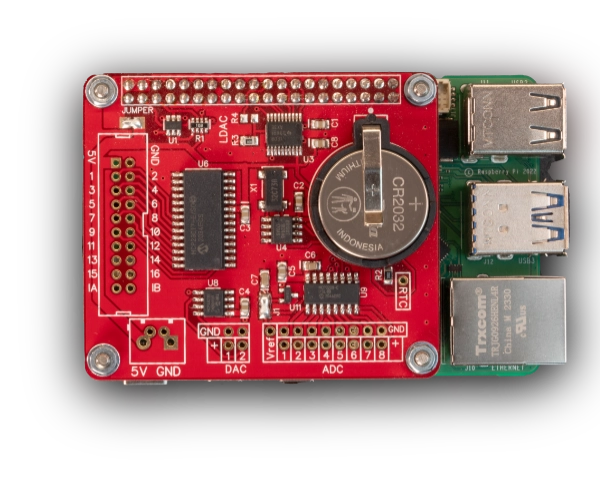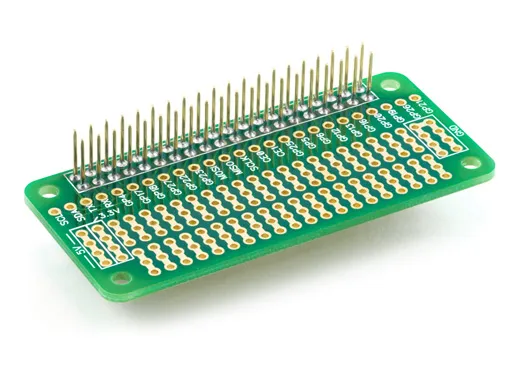Celebrating 12 Years of building Raspberry Pi Development Boards
As we celebrate our 12th anniversary, we reflect on our journey, the challenges we've overcome, and the milestones we've achieved.
The Raspberry Pi
February 2012, saw the release of the first low cost Raspberry Pi model which revolutionised the world of computing, making it accessible and affordable for hobbyists, educators, and professionals alike.
The new Model B featured a 700 MHz ARM11 processor, 256 MB of RAM, and an array of ports, including HDMI, USB, and Ethernet. It also included a GPIO (General Purpose Input/Output) header, which allowed users to connect various sensors and devices, making it ideal for a wide range of projects.
The Raspberry Pi GPIO header only allowed digital communications and unlike the popular Arduino boards this did not have any analogue inputs to measure voltages.
Making Development Boards

In 2012 we built a simple analogue input board for the new Raspberry Pi to use with our home solar logging system. After posting an article on our blog about the new analogue board we received a lot of enquiries for a commercial version other people could purchase to use on their own Raspberry Pi’s.
We designed a small PCB to fit onto the Raspberry Pi GPIO header and ordered the components to build the boards. We also started work on a new e-commerce website to sell the boards online.

The first 100 ADC Pi PCB’s arrived in September 2012 and after hand placing all the components we launched our new e-commerce website called AB Electronics UK and quickly sold the first 100 boards.
In November 2012, following feedback on the initial design we redesigned the PCB and upgraded the ADC chips to use the MCP3424 ADC chip from Microchip which is an 18-bit ADC improving the resolution from the original design.
We then started to work on an IO expander which evolved into the IO Pi Plus with 32 GPIO channels and a design that can be stacked up to four boards high giving up to 128 additional input and output channels.
The initial two products have evolved into over 40 development boards and accessories for the Raspberry Pi and compatible computer boards which we sell today.
Making our development boards stackable and different to others available

Many other businesses have released Raspberry Pi Hats and development boards but nearly all are designed to only allow one board to be used at a time on your Raspberry Pi. We wanted our boards to be stackable and allow you to mix the boards used at the same time and after a lot of research we found a source of a 40 pin header connector with longer pins allowing it to be stacked with spacers between each board.
The Development Boards and changes to the Raspberry Pi HAT format
Over the years, we've expanded the product line-up to include a wide range of accessories, each designed to meet the evolving needs of our customers. Some of our most popular products include:
-
ADC Pi An analogue-to-digital converter board that allows Raspberry Pi to interface with analogue sensors.
-
IO Pi A digital IO expander with 32 inputs and outputs which could be stacked to add up to 128 IO channels.
-
RTC Pi A real-time clock module that ensures accurate timekeeping, even when the Raspberry Pi is powered off.
-
Servo PWM Pi A servo controller board that makes it easy to control multiple servos for robotics and automation projects.
-
Serial Pi A RS232 serial port interface to communicate with other serial devices.
-
RS485 Pi A RS485 interface to communicate with other RS485 devices.
-
Expander Pi Analogue, Digital and RTC development Interface for the Raspberry Pi
Each of these development boards evolved and continuously improved based on feedback from our users and evolved from the first 26 pin GPIO header to the 40 pin GPIO header on later Raspberry Pi boards and compatible clones from other manufacturers.
Software Support
When the Raspberry Pi was released there was very little support for using the GPIO header and only a few libraries to allow access to the I2C port which we used to communicate with the chips used on many of our development boards.
We wrote Python libraries to interface with the new boards and over time we expanded to support the following languages.
C, C++, MicroPython, Python, .Net Core, Arduino, Windows 10 IOT and Node JS.
You can download the different libraries from the knowledge base on our shop.
Community and Collaboration
One of the most rewarding aspects has been our interaction with the Raspberry Pi community. We believe in the power of collaboration and open-source development. Over the years, we've supported countless projects, contributed to open-source software, and provided detailed documentation and tutorials to help users get the most out of our products.
We take pride in the fact that our products have been used in educational initiatives around the world, helping to inspire the next generation of engineers and programmers.
Component supply problems and Covid 19
The component supply problems during Covid 19 caused major problems across many industries and the electronics industry suffered with lack of availability for many components which resulted in parts we had used for many years no longer being available and price increases for many other components.
This resulted in us redesigning some of the boards to use alternative chips and parts.
The supply issues also resulted in the Raspberry Pi boards being in very short supply as the Raspberry Pi foundation switched production to supply their business customers rather than hobbyists and consumers.
Your Raspberry Pi Projects Start Here
Please support the blog and our projects by buying your Raspberry Pi development boards and accessories from our online store at AB Electronics UK.

Raspberry Pi Alternatives
Today there are many other small form factor computer boards which use the same 40 pin GPIO header layout and we are trying to support these if possible. Software support on many of these alternatives can be an issue with little documentation and driver issues.
We have tested the following small form factor computers and they can be used with many of our development boards: Asus Tinker Board, Arduino, Orange Pi and ODroid
We hope to be able to expand the boards we support in the future subject to driver support on the new platforms.
Thank You
Andrew and I want to take this opportunity to thank our customers, partners, and the Raspberry Pi community for their unwavering support over the past 12 years. Your feedback, ideas, and enthusiasm have been instrumental in our success, and we look forward to continuing this journey together.
For more information about our products and to stay updated on our latest developments, visit us at AB Electronics UK.

Comments